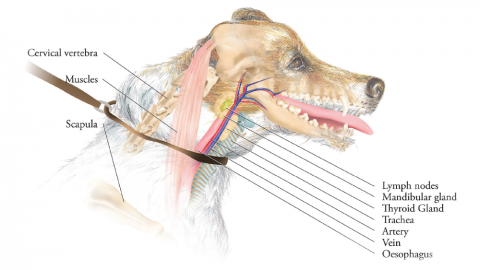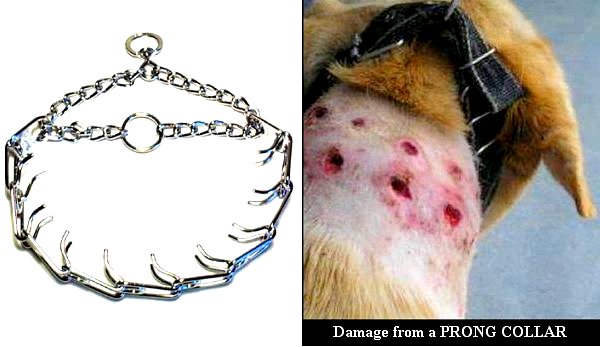Dangers of using prong (pinch) collars

I am sharing this because I feel very strongly about this. Many people using prong (pinch) collars say it doesn’t hurt the dogs. But how many people have tried it on themselves and tugged on it? If it hurts on your neck, it hurts on their neck even more. If you won’t put it on yourself or your child, you shouldn’t put it on your dog. You should have adopted a smaller dog if you cannot control your dog any other way. If you see someone with this on their dog, please politely ask them to consider not using them. You could be saving a dog from a lifetime of trauma, pain, and even death. Ask your legislators to introduce a bill to ban cruel prong collars. Thank you!!
Learn more: 👉 PETA.org, Stop Hurting Your Dog: Throw Out Prong, Choke, and Shock Collars.
Your dog wouldn’t do this to you—don’t do it to them. pic.twitter.com/lm1tDFtv3Q
— PETA (@peta) March 14, 2022
The German Animal Welfare Act states that they train by causing “significant pain, suffering or harm to the animal.” Prong collars are illegal in Spain, France, Sweden, Austria, Switzerland, Germany, New Zealand, the Australian state of Victoria, and the Canadian province of Quebec. Why does the USA allow this cruel treatment of dogs by allowing prong collars?
🐶 San Francisco SPCA (San Francisco Society for the Prevention of Cruelty to Animals) banned prong collars on their campus in 2016. “Prong collars cause injuries and behavioral problems,” the SPCA says in their announcement of the ban, arguing that “prong collars are designed to inflict pain and discomfort and can cause serious physical, behavioral, and emotional damage.” Not only, says the SF SPCA, can prong collars lead to injuries “from skin irritation and punctures to spinal cord problems,” but they “often lead to long-term behavioral problems,” as “if pain is experienced during everyday activities, like walks and vet visits, dogs can begin to associate an owner’s presence, and other harmless stimuli encountered while wearing the prong, with fear and discomfort.”
👉 Click HERE to learn more.
👉 Click HERE to learn more about different types of collars and leashes.
🐶 Why This Veterinarian Hates Prong (aka “Pinch”) Collars.
Click HERE to read and share.
🐶 [Sharing from PETA] What are the dangers of using choke and prong collars?
Click HERE to share.
Choke and prong collars are designed to punish dogs for pulling by inflicting pain and discomfort. They can cause serious physical and emotional damage to dogs and should never be used.
The use of choke collars has been associated with whiplash, fainting, spinal cord injuries leading to paralysis, crushing of the trachea with partial or complete asphyxiation, crushing and/or fracture of the bones in the larynx, dislocated neck bones, bruising of the esophagus, bruising and damage to the skin and tissues in the neck, brain damage and prolapsed eyes caused by sharp increases in pressure in the head, and other injuries.
The metal spikes of prong collars pinch the skin around dogs’ necks when they pull and can scratch or puncture them. Over time, this can cause dogs to develop scar tissue (which has no feeling) and/or build up a tolerance to the painful pinching sensation and thus continue to pull, making walks even more difficult. Dogs may interpret the tightening of a choke or prong collar around their neck as a stranglehold (which it is, after all!) and become fearful or even aggressive.
The most humane and safest option for walking a dog who tends to want to pull is a front-leash attachment harness, such as the Sense-ation. When dogs lunge or pull while wearing the Sense-ation harness, the front leash attachment redirects them back toward the dogwalker. With patience and positive reinforcement, walks can be a pleasant experience for both human and dog.
According to Veterinarian Dr. James Greenwell in his article, “How Choke Collars Can Do Some Real Damage to Your Canine Friend,” choke collars “represent an unseen danger that lurks behind a seemingly harmless leash.” Click HERE to read.
1. It’s Physically Painful
Attaching a tight leash ( or even a loose one that is poorly constructed ) causes an unimaginable pain to your pet friend is he were to accidentally lunge forward and blast his neck at the end of the leash. One of the reasons here is because a dog’s neck, unlike a human’s is quite delicate and more vulnerable to injurious tension. For example, the thyroid gland in a dog is located in the frontal part of the neck just below the larynx. This is also where a choke collar applies undue pressure when he is tugged on suddenly. If anything, just one incident of thrusting this collar an inhumane and sudden way can cause your dog a sharp tinge of pain that could last for weeks on end.
The neck injuries that your dog could sustain from a choke collar can also deteriorate to something as severe as the destruction of the animal’s thyroid cells. Which, as a consequence, will usually lead to the deficit of the naturally produced thyroid hormone. This result is perennial skin problems, unexplained hair loss, a lot of weight gain and low energy levels.
2. Could Result to Long Lasting Neck Injuries
A classical example of this laryngeal paralysis that is primarily caused by excessive pulling and tugging on a collar, particularly when this becomes a habit. In this case, the immediate lunging on a choke collar damages the very-important laryngeal nerve which is one of the longest nerves in a canine’s body. And anything that compresses or applies injurious pressure on this nerve can alter and damage how the larynx works normally. This is also another good reason to substitute that regular choke collar with a suitable premium no-pull harness.
3. Behavioral Problems
Just as you would guess, an uncomfortable and irritated dog is an angry canine and a lousy playmate. Since a leash or a choke collar can gradually cause your dog a lot of discomfort, pain, and disease, it is also safe to assume that the same collar will make him an unhappy dog. No wonder some of the most vicious and unfriendly dogs are those that are perpetually on a tight leash.
According to Animal Hospital of North Ashville, “The use of aversive tools has disadvantages on more than just the physical level, although physical injuries are the most obvious: Choke chains tighten around the dog’s neck with little or no control by the handler over the degree of tightening, potentially strangling the dog to death.
Less drastic and more common, choke chains can lead to fainting, cause tracheal and esophageal injuries, damage ocular blood vessels, and cause nerve damage and transient paralysis as well as neck sprains. Prong or pinch collars can pinch the dog’s trachea. Improperly fitted or inappropriately sized choke and pinch collars can become embedded in the dog’s skin.
Both choke chains and prong collars can damage the thyroid gland, salivary glands, or salivary lymph nodes. The contact points of electric shock collars can irritate the skin and cause hot spots, but they also have the potential to burn holes in the skin.
Worse than many of the physical injuries, and a lot slower to heal, are the mental scars and behavioral implications of aversive training methods.”
According to the Ruby Leslie, the WFA Companion Animal Trainer and Founder, “Leash corrections, jerking on the leash, using prong collars, choke collars, slip leashes and neck collars will only acerbate behavioural issues such as aggression and fear, not stop them, as the pain creates psychological and physical damage to your dog.” “Training using punishment is abusive, inhumane and misused. These practices compromise your dog’s ability to learn by increasing their insecurities, developing long-term and sometimes lasting emotional or physical damage.”
- Collars: Neck collars and the pressure they cause on a dog’s sensitive neck are linked to Ear and eye issues, Hypothyroidism, Malfunction of the nervous system in a dog’s forelimbs, Behavioural problems.
- Slip Leads: “The primary underlying reason for most behavioural issues are disease or pain, so consider that by using a slip leash you are contributing to this pain and worsening your dog’s health and welfare, not helping it.”
- Head Halters: “due to the negative emotional effects, discomfort for dogs, health and safety implications, trainers must not use them.” “The potential is too high for injury to a dog’s soft tissue, spine and psychological damage over prolonged use.” “There can be long-term health implications including injury to the neck and spine and prevention of natural gait and the dog determining his/her personal space.” (Rosee Riggs, 2019)
According to the Humane Society of Utah regarding the regular collar, “The area around a dog’s throat is one of the most vulnerable parts of their body. Research finds that when a dog pulls, or the leash is jerked, the pressure exerted on a dog’s neck by a flat collar is enough to risk damage to the dog’s neck. Collars should only be used to display ID tags, not for restraint or control. Harnesses are a better option to control your dog safely. Slip and prong collars can cause injury to your dog’s neck and spine. Even when used correctly, these collars work by causing pain.” If regular collars can be dangerous for dogs, imagine the extent of damage a prong collar can cause. A harness is the safest and most humane option for your dog. 👉 Learn more HERE.

🐶 Want to learn more?
Don’t Jerk or Pull, Use a Harness (Welfare for Animals):
👉 Part 1/4. Fido Pulls
👉 Part 2/4. Equipment That Hurts
👉 Part 3/4. Collars, Slip Leads and Head Halters
👉 Part 4/4. Why “Y” Harnesses
Collars or Harnesses? (Humane Society of Utah):
👉 Why Harnesses?
What you can do
1. If you see a dog wearing a prong collar, politely talk to the dog guardian about the dangers of the prong collar. Avoid accusing them or getting angry, but instead calmly use the talking points provided in this article.
2. If you have extra dog harnesses, offer them to the dog guardian using the prong collar on their animal. Let them know that while you understand they don’t intend to treat their dog unkindly, there are benefits to using other methods to control their dog.
3. If you currently use a prong or regular collar on your dog, please consider using a harness instead. It’s much safer and more comfortable for the dogs. Wouldn’t you rather wear a harness than a collar if you were a dog?
4. Talk to your legislators about why this issue is important and ask them to consider drafting a bill to outlaw the use and sale of prong collars. Reference the points provided in the above article.
👉 United States: Find Your California Representative
👉 United States: Find Your U.S. Congressional District Representative
👉 United States: Find Your Congressional Members
👉 United States: Directory of Senators
👉 United States: Directory of Representatives
👉 United States: The President
👉 United States: The Vice President
Dear (Assemblymember/Congressman/Congresswoman/Representative/Senator ______),
I hope this message finds you well. As someone who cares deeply about the welfare of animals, I am reaching out to you with an urgent request. Has a dog ever been, or is one now, a beloved member of your family? Would you take action to ensure that man’s best friend is kept safe and free from pain?
I am concerned about a widely used training tool called the prong or pinch collar. These collars, designed with sharp metal prongs that press into a dog’s neck, cause significant pain and can result in serious harm. The German Animal Welfare Act describes such tools as causing “significant pain, suffering or harm to the animal.” It is disheartening to see that prong collars are still permitted in the United States, while they have been banned in countries like Spain, France, Sweden, Austria, Switzerland, Germany, Norway, New Zealand, the Australian state of Victoria, and the Canadian province of Quebec.
I urge you to take a stand and introduce a bill to ban the use and sale of prong collars in the United States. The petition below details the harm these collars cause and provides additional context for this request: https://chng.it/NPhM4nTQjY. Over 28,000 animal advocates worldwide have signed it, and more people are signing our petition every day.
By taking action, you have the unique opportunity to protect countless dogs from unnecessary suffering and lead the United States to demonstrate profound compassion and ethical treatment toward animals. Thank you for considering this important issue. I look forward to your positive response.
Sincerely,
Your name, City, State, Country
5. Ask your veterinary office to discourage patrons from using prong collars or other harmful training tools. Send your letter or email to as many veterinary offices as possible.
👉 Use an internet search to find veterinarians in your area, city, or state.
👉 Send your message to the major veterinary hospital networks in the U.S., such as:
VCA Animal Hospitals
Banfield Pet Hospitals
Petco’s Vetco Total Care
BluePearl Pet Hospitals
National Veterinary Associates (NVA)
American Veterinary Group (AVG)
👉 Click HERE for the U.S. Department of Agriculture’s Find Accredited Veterinarians page.
Subject: Urgent Request to Speak Out Against the Use of Prong Collars
Dear (Veterinary Hospital or Veterinarian’s Name),
I hope this message finds you well. As someone who cares deeply about the welfare of animals, I am reaching out to you with an urgent request. As a professional who understands the physical and emotional needs of animals, I ask for your support in addressing a significant issue impacting the health and well-being of dogs across the United States.
I am deeply concerned about the widespread use of prong collars—training tools designed with sharp metal prongs that press into a dog’s neck. These collars cause significant pain and can lead to serious harm. The German Animal Welfare Act describes such tools as causing “significant pain, suffering or harm to the animal.” Unfortunately, prong collars are still legal in the United States, while they have been banned in many countries such as Spain, France, Sweden, Austria, Switzerland, Germany, Norway, New Zealand, the Australian state of Victoria, and the Canadian province of Quebec.
As a veterinary professional, you have the unique opportunity to influence the welfare of countless dogs. Please take a stand against the use of prong collars and help raise awareness about the pain and harm they cause. The petition below provides further details about the harm these collars inflict and additional context on the need for change: https://chng.it/NPhM4nTQjY. Over 28,000 animal advocates worldwide have already signed this petition, and more people are joining every day.
By voicing your concern and supporting efforts to ban prong collars, you can help protect animals from unnecessary suffering and show a commitment to promoting the compassionate and ethical treatment of all creatures.
Thank you for considering this critical issue. I look forward to your support and working together to make a lasting difference for the animals who need us most.
Sincerely,
Your name, City, State, Country
6. Ask the American Veterinary Medical Association (AVMA) to speak out against the use of prong collars or other dangerous collars by dog guardians.
👉 Email 📧 msanfilippo@avma.org; cmaccarthy@avma.org; mrosati@avma.org; lhoward@avma.org;
👉 Click HERE to send an online message to AVMA.
📬American Veterinary Medical Association
1931 North Meacham Road, Suite 100
Schaumburg, IL 60173-4360
USA
☎️ Phone: 800-248-2862
Subject: Urgent Request to Speak Out Against the Use of Prong Collars
Dear American Veterinary Medical Association (AVMA),
I hope this message finds you well. As an organization that deeply cares about the health and welfare of animals, I am reaching out to you with an urgent request. As veterinary professionals, you understand the physical and emotional needs of animals, and your leadership could play a pivotal role in addressing a growing issue that affects the well-being of dogs across the United States.
I am deeply concerned about the use of prong collars—training tools that consist of sharp metal prongs that press into a dog’s neck. These collars cause significant pain and can lead to serious harm. The German Animal Welfare Act recognizes such devices as causing “significant pain, suffering or harm to the animal.” Sadly, despite the overwhelming evidence of the harm they cause, prong collars remain legal in the United States, while many countries, including Spain, France, Sweden, Austria, Switzerland, Germany, Norway, New Zealand, the Australian state of Victoria, and the Canadian province of Quebec, have already banned them.
As the leading professional organization for veterinarians in the United States, the AVMA has the unique opportunity to influence public awareness and policy surrounding the welfare of animals. I urge you to take a stand against the use of prong collars and to advocate for their ban in the United States. The petition below outlines the harm these collars cause and provides additional context on the need for change: https://chng.it/NPhM4nTQjY. Over 28,000 animal advocates worldwide have already signed it, and more continue to join every day.
By endorsing efforts to ban prong collars, the AVMA can help protect animals from unnecessary suffering and reinforce its commitment to promoting the highest standards of compassionate, ethical treatment of all animals.
Thank you for your attention to this critical issue. I look forward to your support and working together to create lasting change for the animals who need our voices.
Sincerely,
Your name, City, State, Country
7. Ask the American Veterinary Medical Foundation (AVMF) to speak out against the use of prong collars or other dangerous collars by dog guardians.
👉 Email 📧 drjohnson@avma.org; DGranstrom@avma.org; guresti@avma.org; vdemuro@avma.org; kjohnson@avma.org; mkreiling@avma.org; jmccarron@avma.org;
👉 Send a letter or call the AVMF.
📬 American Veterinary Medical Foundation (AVMF)
1931 N. Meacham Rd. Suite 100,
Schaumburg, IL 60173
USA
☎️ 1-800-248-2862 x 6690
Subject: Urgent Request to Speak Out Against the Use of Prong Collars
Dear American Veterinary Medical Foundation (AVMF),
I hope this message finds you well. As an organization dedicated to advancing veterinary medicine and improving animal and human health, I am reaching out with an urgent request that aligns with your mission. There is a critical issue affecting the welfare of dogs across the United States, and the AVMF is uniquely positioned to take a stand.
I am deeply concerned about prong collars—training tools with sharp metal prongs that press into a dog’s neck, causing significant pain and harm. The German Animal Welfare Act has deemed these devices to cause “significant pain, suffering or harm to the animal.”
It is troubling that prong collars remain legal in the U.S. while they have been banned in countries such as Spain, France, Sweden, Austria, Switzerland, Germany, Norway, New Zealand, the Australian state of Victoria, and the Canadian province of Quebec. As the leading foundation for animal health and welfare, the AVMF can play a key role in protecting animals from unnecessary suffering.
I urge you to support a ban on prong collars in the U.S. This would promote compassionate treatment of animals and align with your mission. The petition below outlines the harm these collars cause: https://chng.it/NPhM4nTQjY. Over 28,000 advocates worldwide have signed, and the number continues to grow.
Your endorsement would send a strong message about the importance of ethical treatment and animal welfare.
Thank you for considering this important issue. I look forward to your support in ensuring all animals receive the respect and care they deserve.
Sincerely,
Your name, City, State, Country
8. Ask major retailers selling prong collars in the United States to stop the sale of prong collars and other dangerous collars.
👉 Amazon Email 📧 amazon-pr@amazon.com; aws-pr@amazon.com;
👉 Walmart Email 📧 storehelp@walmart.com;
👉 Petco Email 📧customerrelations@petco.com;
👉 Send your online message to the major retailers in the U.S.:
Amazon
Walmart
Petsmart
Chewy.com
Petco
Tractor Supply Company
Ace Hardware
Subject: Urgent Request to Discontinue the Sale of Prong Collars
Dear (Retailer Name),
I hope this message finds you well. As someone who cares deeply about the welfare of animals, I am reaching out with an urgent request regarding a product currently sold by your store: the prong collar.
As you may be aware, prong collars are training tools designed with sharp metal prongs that dig into a dog’s neck when pulled. This causes significant pain, physical harm, and emotional distress to the animal. Such collars have been widely criticized by animal welfare organizations, with the German Animal Welfare Act explicitly labeling them as causing “significant pain, suffering, or harm to the animal.”
It is deeply concerning that prong collars remain available for sale in the United States, despite being banned in countries like Spain, France, Sweden, Austria, Switzerland, Germany, Norway, New Zealand, and the Australian state of Victoria, along with the Canadian province of Quebec.
I urge you to take a stand for animal welfare by discontinuing the sale of prong collars in your stores. By doing so, you will be helping protect countless dogs from unnecessary suffering and aligning your business with the ethical treatment of animals.
For further information, please review the petition linked here: https://chng.it/NPhM4nTQjY. Over 28,000 animal advocates worldwide have signed it, and we are gaining momentum every day.
Thank you for your attention to this important issue. I look forward to your positive response and your commitment to protecting animals in our communities.
Sincerely,
Your name, City, State, Country
9. Does your country allow prong collars? You can take action by speaking out and pressuring your government to ban them. 📣 Feel free to use our campaign as a starting point for your own advocacy efforts.💪








































Terrible, poor animal ..
e’ INUMANO INCIVILE BARBARO TRATTARE UN POVERO ANIMALE IN QUESTO MODO
This is just not acceptable.
This is not only unacceptable, but cruel and sadistic.
Just horrible!
Please outlaw prong dog collars. They injure dogs and are inhumane.
Why would anyone want to hurt their dog in this way? Use common sense! Use harnesses!
Really horrible, stop using it immediately.
How anyone could ever think these are a useful tool for training!
Kaikkien pantojen käytö pitäisi kieltää, koskaan koiran kaulassa on paljon hermoja. Turvalliset ovat valjaat
Stop Horror
Animals feel pain like we do and have no defense against this horrible instrument of torture.
ORRORE … se vuoi il cane e nonlo sai GESTIRE non lo prendere